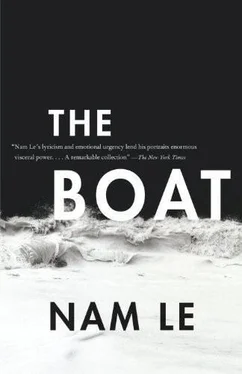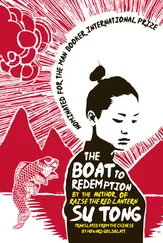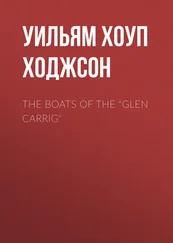The look on her face was strange, shut down. She considered me a long time. Then she got up and pulled on her clothes. "Just make sure you get your story done," she said.
***
I DRANK BEFORE I CAME HERE TOO. I drank when I was a student at university, and then when I was a lawyer — in my previous life, as they say. There was a subterranean bar in a hotel next to my work, and every night I would wander down and slump on a barstool and pretend I didn't want the bartender to make small talk. He was only a bit older than me, and I came to envy his ease, his confidence that any given situation was merely temporary. I left exorbitant tips. After a while I was treated to battered shrimps and shepherd's pies on the house. My parents had already split by then, my father moving to Sydney, my mother into a government fiat.
That's all I've ever done, traffic in words. Sometimes I still think about word counts the way a general must think about casualties. I'd been in Iowa more than a year — days passed in weeks, then months, more than a year of days — and I'd written only three and a half stories. About seventeen thousand words. When I was working at the law firm, I would have written that many words in a couple of weeks. And they would have been useful to someone.
Deadlines came, exhausting, and I forced myself up to meet them. Then, in the great spans of time between, I fell back to my vacant screen and my slowly sludging mind. I tried everything — writing in longhand, writing in my bed, in my bathtub. As this last deadline approached, I remembered a friend claiming he'd broken his writer's block by switching to a typewriter. You're free to write, he told me, once you know you can't delete what you've written. I bought an electric Smith Corona at an antique shop. It buzzed like a tropical aquarium when I plugged it in. It looked good on my desk. For inspiration, I read absurdly formal Victorian poetry and drank Scotch neat. How hard could it be? Things happened in this world all the time. All I had to do was record them. In the sky, two swarms of swallows converged, pulled apart, interwove again like veils drifting at crosscurrents. In line at the supermarket, a black woman leaned forward and kissed the handle of her shopping cart, her skin dark and glossy like the polished wood of a piano.
The week prior to my father's arrival, a friend chastised me for my persistent defeatism.
"Writer's block?" Under the streetlights, vapors of bourbon puffed out of his mouth. "How can you have writer's block? Just write a story about Vietnam."
We had just come from a party following a reading by the workshop's most recent success, a Chinese woman trying to immigrate to America who had written a book of short stories about Chinese characters in stages of immigration to America. The stories were subtle and good. The gossip was that she'd been offered a substantial six-figure contract for a two-book deal. It was meant to be an unspoken rule that such things were left unspoken. Of course, it was all anyone talked about.
"It's hot," a writing instructor told me at a bar. "Ethnic literature's hot. And important too."
A couple of visiting literary agents took a similar view: "There's a lot of polished writing around," one of them said. "You have to ask yourself, what makes me stand out?" She tag-teamed to her colleague, who answered slowly as though intoning a mantra, "Your background and life experience ."
Other friends were more forthright: "I'm sick of ethnic lit," one said. "It's full of descriptions of exotic food." Or: "You can't tell if the language is spare because the author intended it that way, or because he didn't have the vocab."
I was told about a friend of a friend, a Harvard graduate from Washington, D.C., who had posed in traditional Nigerian garb for his book-jacket photo. I pictured myself standing in a rice paddy, wearing a straw conical hat. Then I pictured my father in the same field, wearing his threadbare fatigues, young and hard-eyed.
"It's a license to bore," my friend said. We were drunk and walking our bikes because both of us, separately, had punctured our tires on the way to the party.
"The characters are always flat, generic. As long as a Chinese writer writes about Chinese people, or a Peruvian writer about Peruvians , or a Russian writer about Russians . ." he said, as though reciting children's doggerel, then stopped, losing his train of thought. His mouth turned up into a doubtful grin. I could tell he was angry about something.
"Look," I said, pointing at a floodlit porch ahead of us. "Those guys have guns." "As long as there's an interesting image or metaphor once in every this much text" — he held out his thumb and forefinger to indicate half a page, his bike wobbling all over the sidewalk. I nodded to him, and then I nodded to one of the guys on the porch, who nodded back. The other guy waved us through with his faux — wood air rifle. A car with its headlights on was idling in the driveway, and girls' voices emerged from inside, squealing, "Don't shoot! Don't shoot!"
"Faulkner, you know," my friend said over the squeals, "he said we should write about the old verities. Love and honor and pity and pride and compassion and sacrifice." A sudden sharp crack behind us, like the striking of a giant typewriter hammer, followed by some muffled shrieks. "I know I'm a bad person for saying this," my friend said, "but that's why I don't mind your work, Nam. Because you could just write about Vietnamese boat people all the time. Like in your third story."
He must have thought my head was bowed in modesty, but in fact I was figuring out whether I'd just been shot in the back of the thigh. I'd felt a distinct sting. The pellet might have ricocheted off something.
"You could totally exploit the Vietnamese thing. But instead, you choose to write about lesbian vampires and Colombian assassins, and Hiroshima orphans — and New York painters with hemorrhoids."
For a dreamlike moment I was taken aback. Cataloged like that, under the bourbon stink of his breath, my stories sank into unflattering relief. My leg was still stinging. I imagined sticking my hand down the back of my jeans, bringing it to my face under a streetlight, and finding it gory, blood-spattered. I imagined turning around, advancing wordlessly up the porch steps, and drop-kicking the two kids. I would tell my story into a microphone from a hospital bed. I would compose my story in a county cell. I would kill one of them, maybe accidentally, and never talk about it, ever, to anyone. There was no hole in my jeans.
“I'm probably a bad person," my friend said, stumbling beside his bike a few steps in front of me.
***
IF YOU ASK ME WHY I CAME TO IOWA, I would say that Iowa is beautiful in the way that any place is beautiful: if you treat it as the answer to a question you're asking yourself every day, just by being there.
That afternoon, as I was leaving the apartment for Linda's, my father called out my name from the bedroom.
I stopped outside the closed door. He was meant to be napping.
"Where are you going?" his voice said.
"For a walk," I replied.
I'll walk with you."
It always struck me how everything seemed larger in scale on Summit Street: the double-storied houses, their smooth lawns sloping down to the sidewalks like golf greens; elm trees with high, thick branches — the sort of branches from which I imagined fathers suspending long-roped swings for daughters in white dresses. The leaves, once golden and red, were turning brown, dark orange. The rain had stopped. I don't know why, but we walked in the middle of the road, dark asphalt gleaming beneath the slick, pasted leaves like the back of a whale.
I asked him, "What do you want to do while you're here?"
Читать дальше











